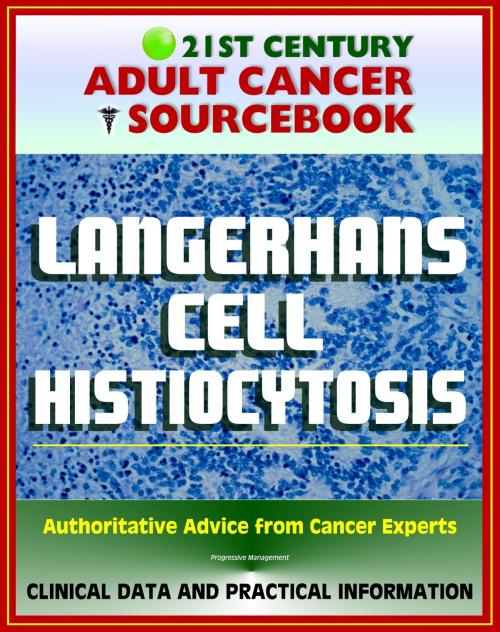21st Century Adult Cancer Sourcebook: Langerhans Cell Histiocytosis (LCH), Eosinophilic Granuloma, Abt-Letterer-Siwe Disease, Hand-Schuller-Christian Disease, Diffuse Reticuloendotheliosis
Nonfiction, Health & Well Being, Health, Ailments & Diseases, Cancer| Author: | Progressive Management | ISBN: | 9781466057913 |
| Publisher: | Progressive Management | Publication: | October 11, 2011 |
| Imprint: | Smashwords Edition | Language: | English |
| Author: | Progressive Management |
| ISBN: | 9781466057913 |
| Publisher: | Progressive Management |
| Publication: | October 11, 2011 |
| Imprint: | Smashwords Edition |
| Language: | English |
Authoritative information and practical advice from the nation's cancer experts about Langerhans Cell Histiocytosis (LCH) includes official medical data on signs, symptoms, early detection, diagnostic testing, risk factors and prevention, treatment options, surgery, radiation, drugs, chemotherapy, staging, biology, prognosis, and survival, with a complete glossary of technical medical terms and current references.
Starting with the basics, and advancing to detailed patient-oriented and physician-quality information, this comprehensive in-depth compilation gives empowered patients, families, caregivers, nurses, and physicians the knowledge they need to understand the diagnosis and treatment of Langerhans Cell Histiocytosis.
Comprehensive data on clinical trials related to LCH is included - - with information on intervention, sponsor, gender, age group, trial phase, number of enrolled patients, funding source, study type, study design, NCT identification number and other IDs, first received date, start date, completion date, primary completion date, last updated date, last verified date, associated acronym, and outcome measures.
Langerhans cell histiocytosis is a disease that can damage tissue or cause lesions to form in one or more places in the body.
Langerhans cell histiocytosis (LCH) is a rare disease that occurs when the body makes too many Langerhans cells. A Langerhans cell is a type of white blood cell that helps the body fight infection. Langerhans cells (also called histiocytes) are normally found in the skin, lymph nodes, spleen, bone marrow, and lungs. In LCH, extra Langerhans cells spread through the blood and build up in certain parts of the body, where they can damage tissue or form tumors.
Scientists do not agree on whether LCH is a type of cancer or is a condition caused by a change in the immune system. LCH is often treated with anticancer drugs that may also be used to treat immune system conditions.
Extensive supplements, with chapters gathered from our Cancer Toolkit series and other reports, cover a broad range of cancer topics useful to cancer patients. This edition includes our exclusive Guide to Leading Medical Websites with updated links to 81 of the best sites for medical information, which let you quickly check for updates from the government and the best commercial portals, news sites, reference/textbook/non-commercial portals, and health organizations. Supplemental coverage includes:
Levels of Evidence for Cancer Treatment Studies
Glossary of Clinical Trial Terms
Clinical Trials Background Information and In-Depth Program
Clinical Trials at NIH
How To Find A Cancer Treatment Trial: A Ten-Step Guide
Taking Part in Cancer Treatment Research Studies
Access to Investigational Drugs
Clinical Trials Conducted by the National Cancer Institute's Center for Cancer Research at the National Institutes of Health Clinical Center
Taking Time: Support for People with Cancer
Facing Forward - Life After Cancer Treatment
Chemotherapy and You
Authoritative information and practical advice from the nation's cancer experts about Langerhans Cell Histiocytosis (LCH) includes official medical data on signs, symptoms, early detection, diagnostic testing, risk factors and prevention, treatment options, surgery, radiation, drugs, chemotherapy, staging, biology, prognosis, and survival, with a complete glossary of technical medical terms and current references.
Starting with the basics, and advancing to detailed patient-oriented and physician-quality information, this comprehensive in-depth compilation gives empowered patients, families, caregivers, nurses, and physicians the knowledge they need to understand the diagnosis and treatment of Langerhans Cell Histiocytosis.
Comprehensive data on clinical trials related to LCH is included - - with information on intervention, sponsor, gender, age group, trial phase, number of enrolled patients, funding source, study type, study design, NCT identification number and other IDs, first received date, start date, completion date, primary completion date, last updated date, last verified date, associated acronym, and outcome measures.
Langerhans cell histiocytosis is a disease that can damage tissue or cause lesions to form in one or more places in the body.
Langerhans cell histiocytosis (LCH) is a rare disease that occurs when the body makes too many Langerhans cells. A Langerhans cell is a type of white blood cell that helps the body fight infection. Langerhans cells (also called histiocytes) are normally found in the skin, lymph nodes, spleen, bone marrow, and lungs. In LCH, extra Langerhans cells spread through the blood and build up in certain parts of the body, where they can damage tissue or form tumors.
Scientists do not agree on whether LCH is a type of cancer or is a condition caused by a change in the immune system. LCH is often treated with anticancer drugs that may also be used to treat immune system conditions.
Extensive supplements, with chapters gathered from our Cancer Toolkit series and other reports, cover a broad range of cancer topics useful to cancer patients. This edition includes our exclusive Guide to Leading Medical Websites with updated links to 81 of the best sites for medical information, which let you quickly check for updates from the government and the best commercial portals, news sites, reference/textbook/non-commercial portals, and health organizations. Supplemental coverage includes:
Levels of Evidence for Cancer Treatment Studies
Glossary of Clinical Trial Terms
Clinical Trials Background Information and In-Depth Program
Clinical Trials at NIH
How To Find A Cancer Treatment Trial: A Ten-Step Guide
Taking Part in Cancer Treatment Research Studies
Access to Investigational Drugs
Clinical Trials Conducted by the National Cancer Institute's Center for Cancer Research at the National Institutes of Health Clinical Center
Taking Time: Support for People with Cancer
Facing Forward - Life After Cancer Treatment
Chemotherapy and You















